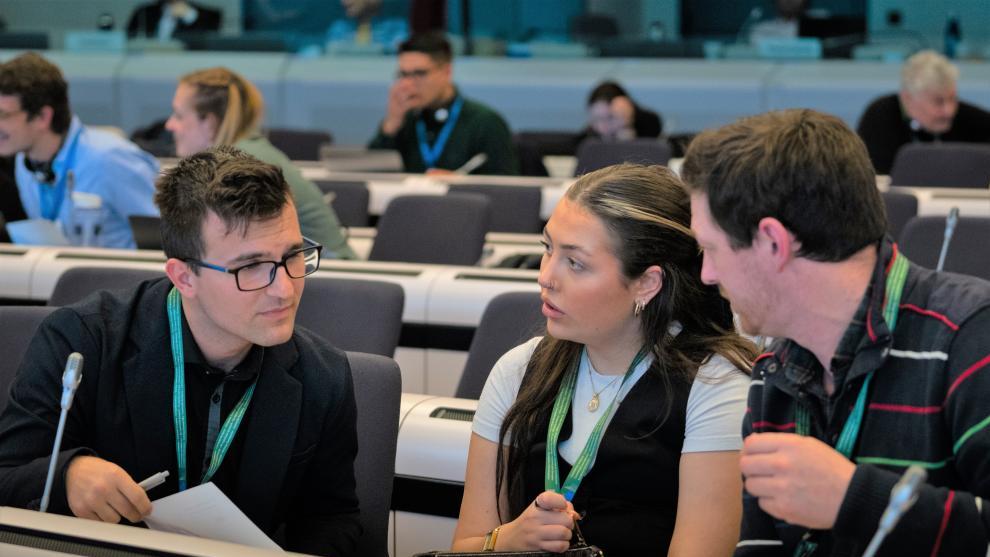EU Citizens' Panel against Hate

On 5 April 2024, an EU Citizens' Panel against hatred in society began in Brussels. The question: What can we do about hate and how can we enhance mutual respect in our societies? 150 randomly selected citizens from all 27 EU Member States will come together to develop concrete recommendations for the European Commission.
On 6 December 2023, the European Commission and the High Representative adopted a communication entitled "No place for hate in Europe". The communication is a call for action to all Europeans to stand up against hatred and speak up for tolerance and respect.
Rise in hate speech and hate crime
"There has been an alarming rise in hate speech and hate crime in Europe, and there is evidence that Jewish and Muslim communities are particularly affected," the communication states. With the communication, the Commission and the High Representative intensified their efforts to combat hate in all its forms by stepping up action in a wide range of policy areas, including security, digital, education, culture and sport.
President of the European Commission, Ursula von der Leyen said: “Europe is a place where diverse cultural and religious identities are honored. Respect and tolerance are the founding values of our societies. Therefore we must stand up against antisemitism and anti-Muslim hatred, whenever we encounter it. The dignity and safety of each and every individual in our Union are paramount.”
Dialogue against hate
High Representative/Vice-President, Josep Borrell said: “Tragically, history repeats itself. Conflicts and disinformation worldwide are sowing the seeds of hatred. All persons must be protected and respected, no matter their religion or belief, nationality, gender, race or any other pretext misused to incite discrimination, hatred or violence. As we approach the 75th anniversary of the Universal Declaration of Human Rights, we cannot make the same mistakes of the past. I urge the international community to join us in upholding human rights for everyone, everywhere, and to fight intolerance and prejudice.”
The Communication “No Place for Hate” specifically calls for the creation of a pan-European space of dialogue, bringing together citizens from across the EU to discuss ways to move from hatred and division to the shared enjoyment of our European values of equality, respect for human rights and dignity. The European Citizens’ Panel on Tackling Hatred in Society is one of the answers to that call. The Panel will aim to identify possible policy actions and all relevant players that should be involved at different levels, including decision-makers, civil society, the private sector and citizens.
Reflecting the diversity of the EU population
The recruitment of participants for the Citizens' Panel "Tackling hated in society" was carried out by the European Commission's contractors, the research institutes Harris Interactive and Le Terrain. They found citizens as forum participants who reflect the diversity of the EU population.
European Citizens' Panels bring together randomly selected citizens from all 27 Member States to discuss important upcoming proposals at European level that affect all EU citizens.
Recommendations to the EU Commission
At the European Citizens' Panels, the participants work together in small groups (around twelve people) or all together (in plenary). They are supported by a moderation team. The participants' discussions result in recommendations that the European Commission should take into account when defining measures and initiatives.
Participants in the citizens' panels are selected at random. Candidates are called. Recruiters randomly dial valid telephone numbers (landline and mobile). In order to reflect the social and demographic composition of the EU population as accurately as possible, the process ensures that a diverse and representative group is addressed.
Data from the following sources are combined to obtain participants:
- Eurobarometer, the annual European Union public opinion survey, and
- Eurostat, the EU’s statistics office
Quotas for gender and young people
A quota system ensures a balanced gender ratio, which also sets the proportion of young people between the ages of 16 and 25 at one third. Other social and demographic characteristics taken into account:
- Level of education
- Place of origin
- Occupation
Participants from the individual member states are selected in proportion to the country's population, ensuring a balanced representation of the various groups. In the case of smaller countries with few participants, these groups are divided between the individual forums so that these countries are also adequately represented. There is a separate selection procedure for each forum.
Citizens' Panel supports EU Commission
The Citizens' Panel against Hate will take place over three weekends, starting on Friday afternoon and ending on Sunday lunchtime:
- Session 1: 5 to 7 April, Brussels (EC premises)
- Session 2: 26 to 28 April, online
- Session 3: 17 to 19 May, Brussels (EC premises)
The recommendations of the mini-public will in particular support the future work of the European Commission to combat hate speech and hate crime. They will serve as a guide to help the EU and its Member States move away from hate and division and towards the common European values enshrined in the Treaty of the European Union.
Learn more